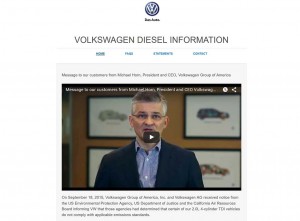Facing what has become the worst crisis in its history, Volkswagen is vowing to come up with a fix for its diesel pollution problem “as soon as possible,” its U.S. subsidiary launched a special website, vwdieselinfo.com, where owners can go for information about the problem.
The maker’s image has been sorely tarnished since the U.S. Environmental Protection Agency announced earlier this month that 482,000 VW diesels sold in the U.S. were equipped with a so-called “defeat device” meant to fool emissions tests while allowing the vehicles to produce up to 40 times the maximum allowable pollution in real-world use.
The revelation has touched off a flurry of investigations in the U.S. as well as overseas, where millions more diesel models were equipped with the suspect software. The number of lawsuits facing VW has rapidly grown, and even after ousting a number of top execs, criminal charges could follow. The situation, if anything, may grow worse with new revelations indicating senior management may have known for years about the cheating.
“You may have noticed that we have stopped advertising our latest TDI models,” the new U.S. consumer website says, referring to the maker’s decision to also halt sales of 4-cylinder diesel products. We did this as an interim step while we seek the government approvals that will allow us to offer our 2.0L 4-cylinder TDI models for sale (once more).”
(New VW CEO Mueller faces long list of major problems. Click Here for the latest.)
How VW will solve that problem, and how long it will take, is far from certain, though the maker promised it wants to have a fix ready “as soon as possible.”

New VW CEO Matthias Mueller faces a mix of short and long-term problems, rebuilding both VW's image and profits.
A variety of industry experts consulted by TheDetroitBureau.com gave insight into the cause of the problem and the challenges the maker faces coming up with that solution. By the middle of the last decade, it became clear that VW’s old “pumpalooza” diesel design would not meet tougher emission standards, especially in the critical California market. As a result, VW engineers set out to reduce emissions even while also improving mileage and performance.
Their initial optimism for the new WA 189 engine steadily diminished – at least internally. Early on, the company hoped to get as much as 60 miles per gallon, then 50 or more. By the time the diesels were ready for market, that had dropped to around 42, depending upon the model.
The problem was that the catalytic system meant to scrub smog-causing oxides of nitrogen wasn’t working as well as projected. An alternate approach, that would have required the use of a urea injection system was deemed too costly and only adopted across the board for the 2015 model-year.
What to do now is apparently the issue VW engineers are racing to resolve. One possibility would be to rewrite the basic engine software. But experts warn that this approach could result in a loss of performance and reduced fuel economy.
(Will other automakers, including Mercedes and Chrysler, be caught up in diesel scandal? Click Here to find out.)
An alternative might require the installation of new pollution control hardware, as well. That would be costly – and it’s not even sure that approach would be practical or possible. Some observers warn that Volkswagen might have to compensate owners for reduced performance and mileage, perhaps even offer a buyback program, as Fiat Chrysler recently announced in connection with defective Ram pickups.
VW insists it will do whatever it takes, the maker’s new website declaring, “We are committed to making this right and preventing it from ever happening again. We will bring these TDI vehicles into compliance with the federal and state emissions regulations.”
This fall-on-the-sword approach is one that turnaround strategists say is absolutely critical if the German maker is to ever rebuild its reputation. VW should know. Thirty years ago, it challenged consumers who were complaining about alleged safety problems with the Audi brand’s big 5000 model. Ultimately, a federal investigation showed the carmaker was correct, but its seemingly arrogant approach so frustrated consumers that they didn’t return to the brand, Audi almost abandoning the U.S. market.
A worst-case scenario for Volkswagen faces is a steady drip of new revelation. And, indeed, new reports published by several German newspapers, including the weekend Frankfurter Allgemeine Sonntagszeitung, indicate the Volkswagen AG supervisory board was warned of the diesel cheating scam by both a key supplier and some of the company’s own engineers. A letter dating back to 2007 shows that the automotive mega-supplier Bosch pointed to illegal modifications to its control software.
VW’s own technicians, according to the reports, first flagged the issue for the board in 2011.
If such reports prove accurate they could complicate not only the carmaker’s legal problems but also its efforts to rebuild its reputation. VW has long prided itself on taking a leadership position in green automotive technology. It could be a long time before consumers take that claim seriously again.
(VW scandal a “black eye” for US diesel market. Click Here for the story.)


There are a number of meritless statements in this story in particular that Audi was “arrogant” over the allegations that the Audi 5000 had unintended acceleration when it NEVER had unintended acceleration issues. It was proven that incompetent vehicle operators were pushing on the accelerator pedal instead of the brake pedal.
Then 20/20 or one of the so called “investigative” U.S. TV shows RIGGED an Audi 5000 to make it crash and look like it was from unintended acceleration – which it was not as there has NEVER been any proof of any unintended acceleration in any Audi 5000 (or other U.S. sold vehicle for that matter, right up to today). Audi sued the TV network/show and WON IN COURT but the public is so technically challenged they believe that the Audi 5000 DID have unintended acceleration and that damaged the entire brand in the U.S. for at least a decade.
I have no sympathy for VW installing improper software in their diesels, but let’s not get carried away with meritless claims of arrogance as one event has nothing to do with the other.
So far every report that I have read on the VW diesel scandal confirms that all of the diesels sold meet or exceed the emissions requirements when operated properly. Any software that disables the proper operation can be replaced with the correct software. A small loss of mpg is likely but it should not be huge based on my info. VW will however need to deal with all of the issues and pay dearly for their poor decision to violate the emissions laws.